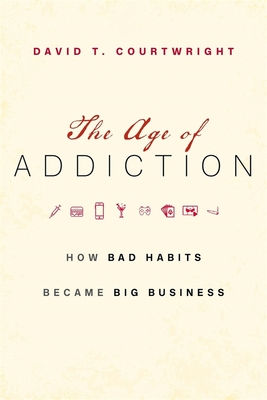

 Belknap Press
Belknap Press
The Age of Addiction: How Bad Habits Became Big Business


Key Metrics
- David T Courtwright
- Belknap Press
- Hardcover
- 9780674737372
- 8.3 X 5.8 X 1.2 inches
- 1.05 pounds
- Psychology > Psychopathology - Addiction
- English
 Secure Transaction
Secure TransactionBook Description
From a leading expert on addiction, a provocative, singularly authoritative history of how sophisticated global businesses have targeted the human brain's reward centers, driving us to addictions ranging from oxycodone to Big Macs to Assassin's Creed to Snapchat--with alarming social consequences.
We live in an age of addiction, from compulsive gaming and shopping to binge eating and opioid abuse. Sugar can be as habit-forming as cocaine, researchers tell us, and social media apps are hooking our kids. But what can we do to resist temptations that insidiously and deliberately rewire our brains? Nothing, David Courtwright says, unless we understand the history and character of the global enterprises that create and cater to our bad habits.
The Age of Addiction chronicles the triumph of what Courtwright calls limbic capitalism, the growing network of competitive businesses targeting the brain pathways responsible for feeling, motivation, and long-term memory. We see its success in Purdue Pharma's pain pills, in McDonald's engineered burgers, and in Tencent video games from China. All capitalize on the ancient quest to discover, cultivate, and refine new and habituating pleasures. The business of satisfying desire assumed a more sinister aspect with the rise of long-distance trade, plantation slavery, anonymous cities, large corporations, and sophisticated marketing. Multinational industries, often with the help of complicit governments and criminal organizations, have multiplied and cheapened seductive forms of brain reward, from junk food to pornography. The internet has brought new addictions: in 2018, the World Health Organization added gaming disorder to its International Classification of Diseases.
Courtwright holds out hope that limbic capitalism can be contained by organized opposition from across the political spectrum. Progressives, nationalists, and traditionalists have made common cause against the purveyors of addiction before. They could do it again.
Author Bio
I have taught medical, U.S., and world history at the University of North Florida, where I am presidential professor emeritus in the Department of History. I have authored books on drug use and drug policy, both in American and world history; the special problems of frontier environments, both on the land and in the air; and, most recently, about the culture war that has roiled American politics since the 1960s. I am currently working on a book about pleasure and capitalism in the modern world.
David T. Courtwright, a graduate of the University of Kansas and Rice University, offers upper-division courses in the history of medicine and disease and American history, notably "The U.S. since World War I" and "The 1960s and Vietnam." His current graduate offerings include readings in U.S. history since 1865 and two internationally oriented research seminars, "The Long 1960s" and "Violence and the State."
Courtwright has published influential books on drug use and drug policy, both in American and world history; the social problems of frontier environments on the land and in the air; and the culture war that roiled American politics during and after the 1960s. Whether it is about drugs, violence, aerospace, or cultural politics, his research is concerned with power, policy, and social structure. His ambition is to identify what drives fundamental changes in modern social and political history. He is currently completing another project in this vein, a book about pleasure, vice, and addiction in the modern world.
Courtwright's teaching and research have been recognized by the John A. Delaney Presidential Professorship, the UNF Distinguished Professor Award, five teaching awards, the College on Problems of Drug Dependence Media Award, and fellowships from the American Historical Association, NASA, the American Council of Learned Societies, and the National Endowment for the Humanities, including a 2016-2017 NEH Public Scholar Award.
Source: University of North Florida
Videos




Community reviews
Write a ReviewNo Community reviews